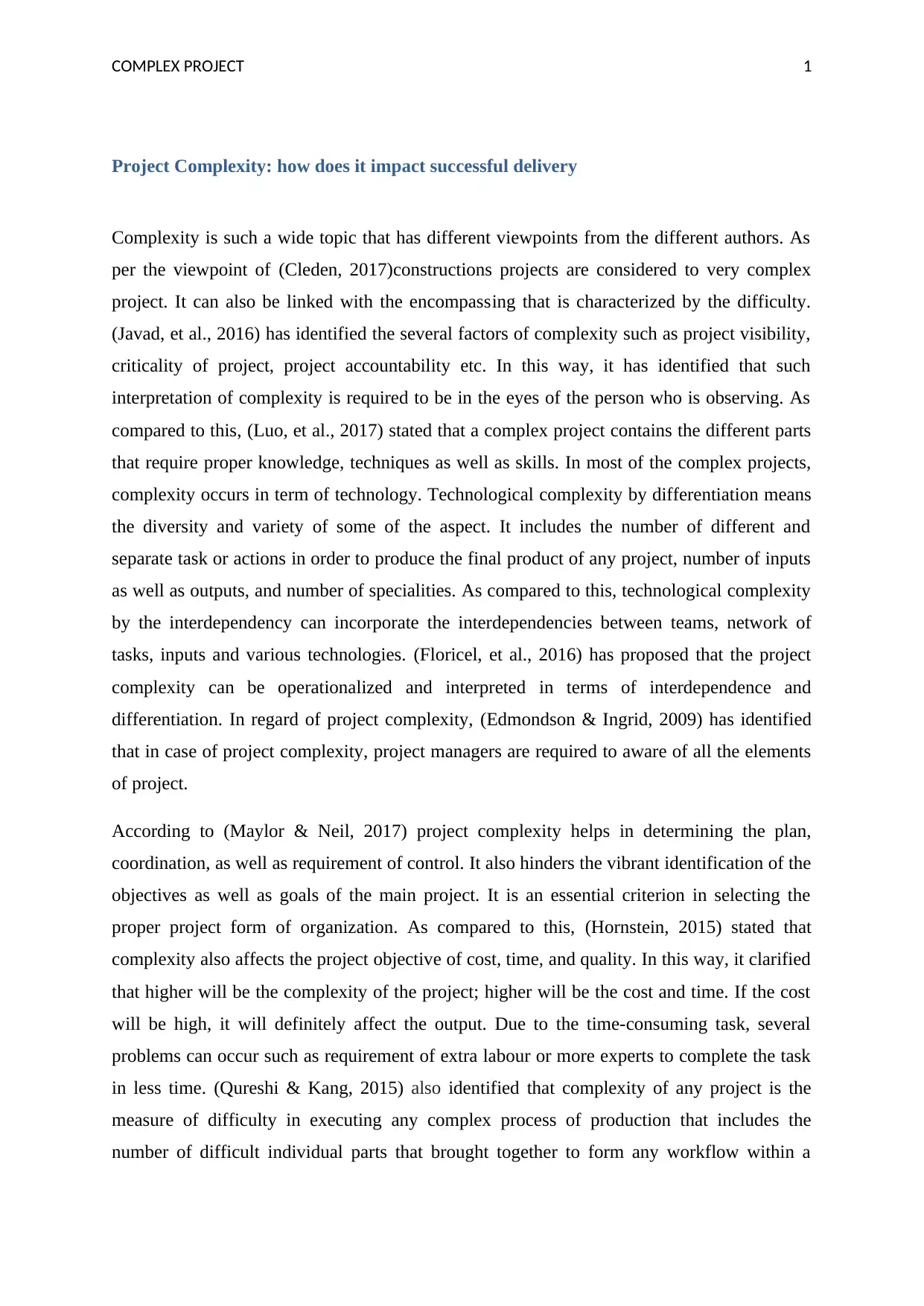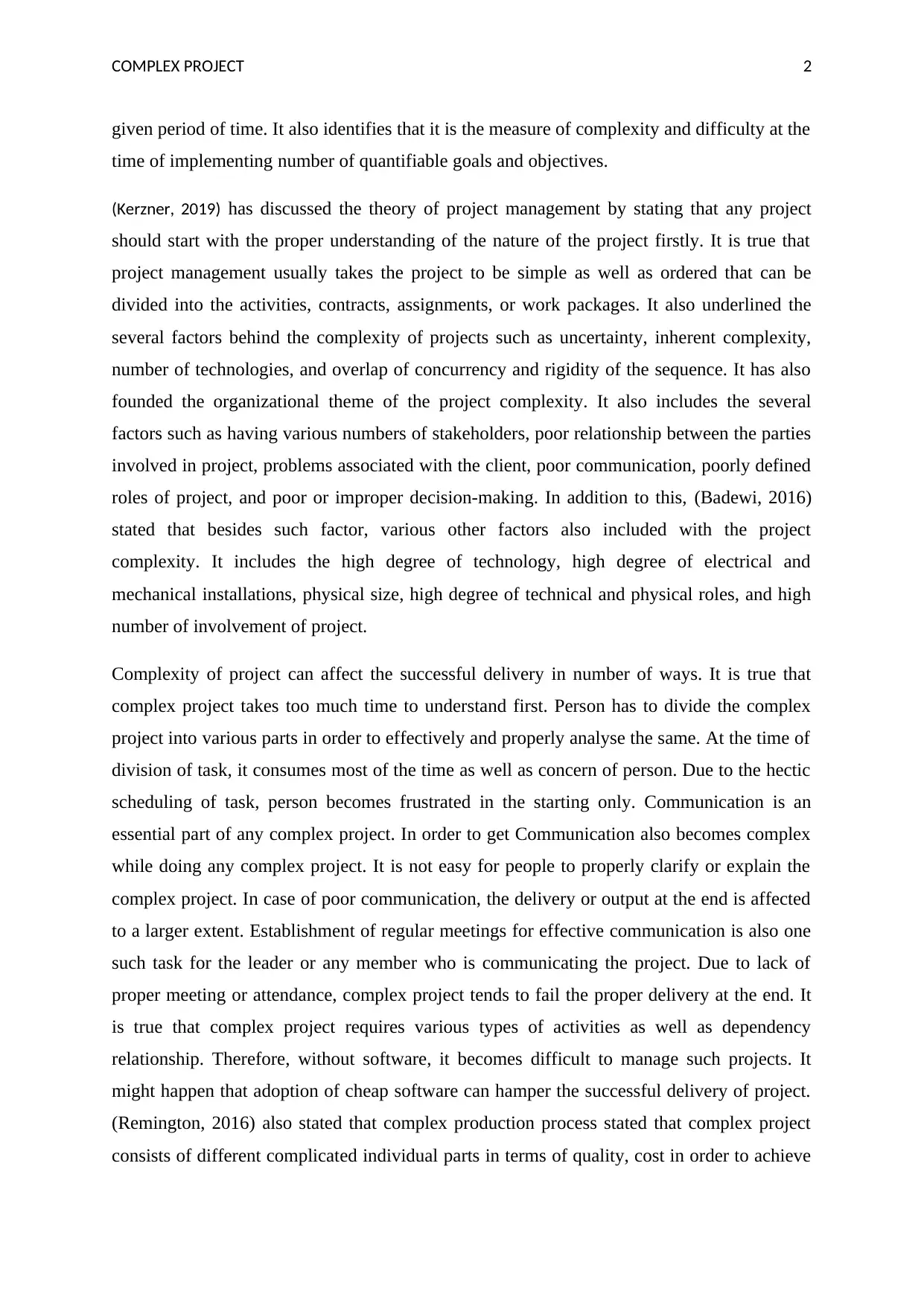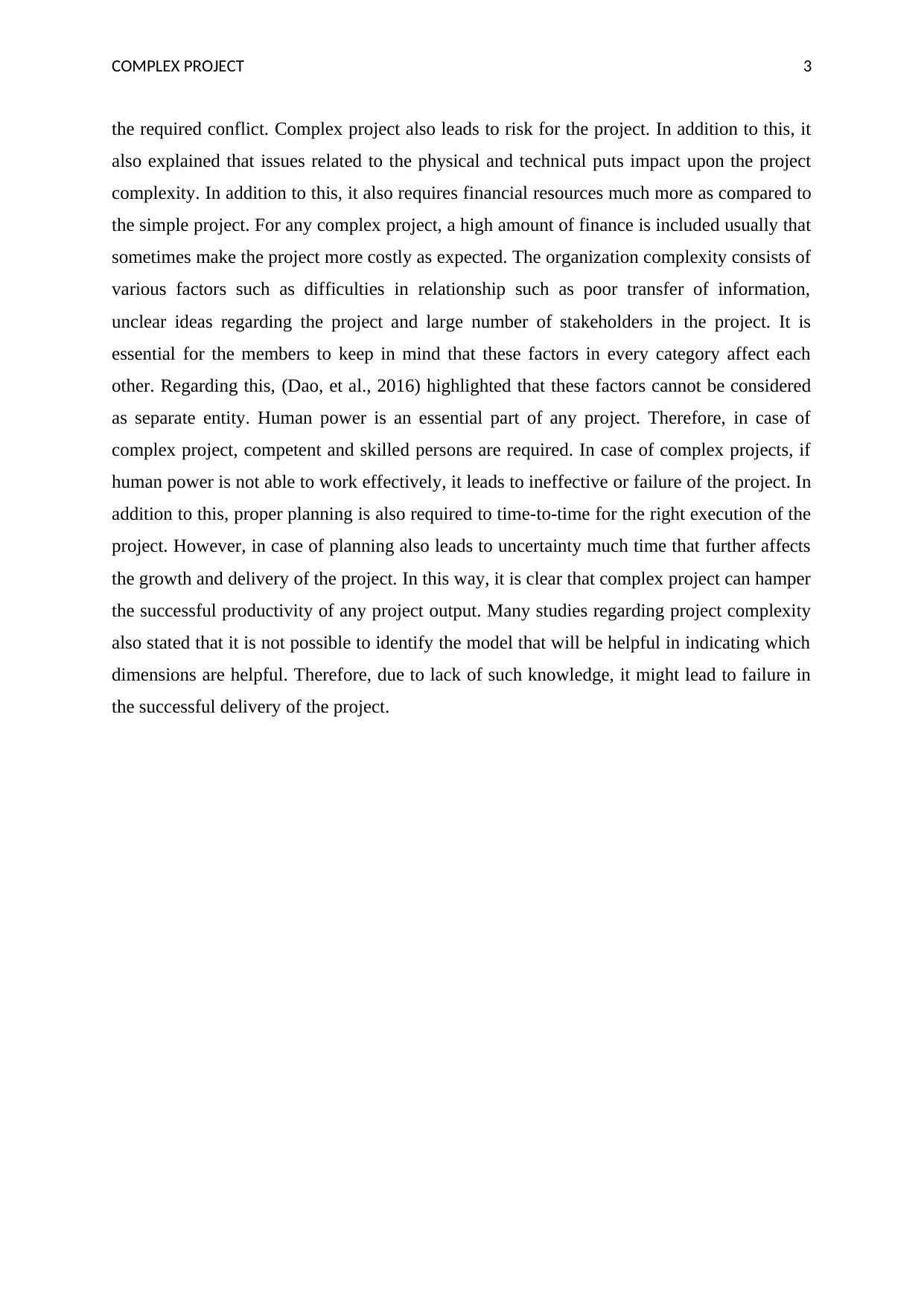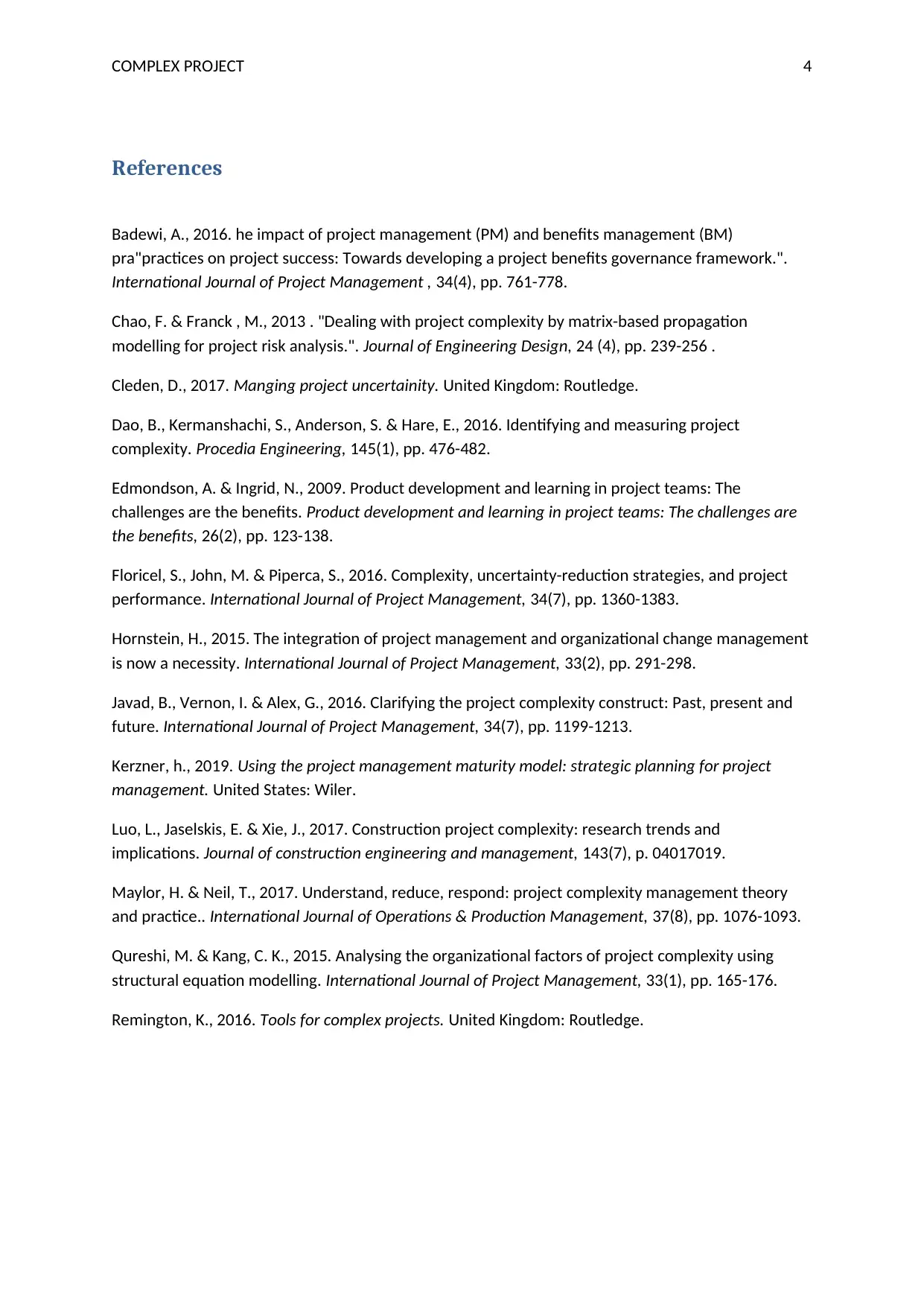INF70007 Leading Complex Projects: Literature Review on Complexity
VerifiedAdded on 2023/04/19
|5
|1792
|219
Literature Review
AI Summary
This literature review explores the multifaceted concept of project complexity and its significant influence on successful project delivery. It synthesizes various perspectives from academic literature, highlighting factors such as technological complexity, organizational structure, and communication challenges. The review critically evaluates how complexity affects project objectives like cost, time, and quality, emphasizing the need for skilled human resources, effective planning, and appropriate software tools. It also addresses the difficulties in establishing universal models for identifying and managing complexity dimensions, ultimately demonstrating how these challenges can hinder project productivity. This document is available on Desklib, a platform offering a wealth of study resources for students.

Running Head: COMPLEX PROJECT 0
Management
Management
Paraphrase This Document
Need a fresh take? Get an instant paraphrase of this document with our AI Paraphraser

COMPLEX PROJECT 1
Project Complexity: how does it impact successful delivery
Complexity is such a wide topic that has different viewpoints from the different authors. As
per the viewpoint of (Cleden, 2017)constructions projects are considered to very complex
project. It can also be linked with the encompassing that is characterized by the difficulty.
(Javad, et al., 2016) has identified the several factors of complexity such as project visibility,
criticality of project, project accountability etc. In this way, it has identified that such
interpretation of complexity is required to be in the eyes of the person who is observing. As
compared to this, (Luo, et al., 2017) stated that a complex project contains the different parts
that require proper knowledge, techniques as well as skills. In most of the complex projects,
complexity occurs in term of technology. Technological complexity by differentiation means
the diversity and variety of some of the aspect. It includes the number of different and
separate task or actions in order to produce the final product of any project, number of inputs
as well as outputs, and number of specialities. As compared to this, technological complexity
by the interdependency can incorporate the interdependencies between teams, network of
tasks, inputs and various technologies. (Floricel, et al., 2016) has proposed that the project
complexity can be operationalized and interpreted in terms of interdependence and
differentiation. In regard of project complexity, (Edmondson & Ingrid, 2009) has identified
that in case of project complexity, project managers are required to aware of all the elements
of project.
According to (Maylor & Neil, 2017) project complexity helps in determining the plan,
coordination, as well as requirement of control. It also hinders the vibrant identification of the
objectives as well as goals of the main project. It is an essential criterion in selecting the
proper project form of organization. As compared to this, (Hornstein, 2015) stated that
complexity also affects the project objective of cost, time, and quality. In this way, it clarified
that higher will be the complexity of the project; higher will be the cost and time. If the cost
will be high, it will definitely affect the output. Due to the time-consuming task, several
problems can occur such as requirement of extra labour or more experts to complete the task
in less time. (Qureshi & Kang, 2015) also identified that complexity of any project is the
measure of difficulty in executing any complex process of production that includes the
number of difficult individual parts that brought together to form any workflow within a
Project Complexity: how does it impact successful delivery
Complexity is such a wide topic that has different viewpoints from the different authors. As
per the viewpoint of (Cleden, 2017)constructions projects are considered to very complex
project. It can also be linked with the encompassing that is characterized by the difficulty.
(Javad, et al., 2016) has identified the several factors of complexity such as project visibility,
criticality of project, project accountability etc. In this way, it has identified that such
interpretation of complexity is required to be in the eyes of the person who is observing. As
compared to this, (Luo, et al., 2017) stated that a complex project contains the different parts
that require proper knowledge, techniques as well as skills. In most of the complex projects,
complexity occurs in term of technology. Technological complexity by differentiation means
the diversity and variety of some of the aspect. It includes the number of different and
separate task or actions in order to produce the final product of any project, number of inputs
as well as outputs, and number of specialities. As compared to this, technological complexity
by the interdependency can incorporate the interdependencies between teams, network of
tasks, inputs and various technologies. (Floricel, et al., 2016) has proposed that the project
complexity can be operationalized and interpreted in terms of interdependence and
differentiation. In regard of project complexity, (Edmondson & Ingrid, 2009) has identified
that in case of project complexity, project managers are required to aware of all the elements
of project.
According to (Maylor & Neil, 2017) project complexity helps in determining the plan,
coordination, as well as requirement of control. It also hinders the vibrant identification of the
objectives as well as goals of the main project. It is an essential criterion in selecting the
proper project form of organization. As compared to this, (Hornstein, 2015) stated that
complexity also affects the project objective of cost, time, and quality. In this way, it clarified
that higher will be the complexity of the project; higher will be the cost and time. If the cost
will be high, it will definitely affect the output. Due to the time-consuming task, several
problems can occur such as requirement of extra labour or more experts to complete the task
in less time. (Qureshi & Kang, 2015) also identified that complexity of any project is the
measure of difficulty in executing any complex process of production that includes the
number of difficult individual parts that brought together to form any workflow within a

COMPLEX PROJECT 2
given period of time. It also identifies that it is the measure of complexity and difficulty at the
time of implementing number of quantifiable goals and objectives.
(Kerzner, 2019) has discussed the theory of project management by stating that any project
should start with the proper understanding of the nature of the project firstly. It is true that
project management usually takes the project to be simple as well as ordered that can be
divided into the activities, contracts, assignments, or work packages. It also underlined the
several factors behind the complexity of projects such as uncertainty, inherent complexity,
number of technologies, and overlap of concurrency and rigidity of the sequence. It has also
founded the organizational theme of the project complexity. It also includes the several
factors such as having various numbers of stakeholders, poor relationship between the parties
involved in project, problems associated with the client, poor communication, poorly defined
roles of project, and poor or improper decision-making. In addition to this, (Badewi, 2016)
stated that besides such factor, various other factors also included with the project
complexity. It includes the high degree of technology, high degree of electrical and
mechanical installations, physical size, high degree of technical and physical roles, and high
number of involvement of project.
Complexity of project can affect the successful delivery in number of ways. It is true that
complex project takes too much time to understand first. Person has to divide the complex
project into various parts in order to effectively and properly analyse the same. At the time of
division of task, it consumes most of the time as well as concern of person. Due to the hectic
scheduling of task, person becomes frustrated in the starting only. Communication is an
essential part of any complex project. In order to get Communication also becomes complex
while doing any complex project. It is not easy for people to properly clarify or explain the
complex project. In case of poor communication, the delivery or output at the end is affected
to a larger extent. Establishment of regular meetings for effective communication is also one
such task for the leader or any member who is communicating the project. Due to lack of
proper meeting or attendance, complex project tends to fail the proper delivery at the end. It
is true that complex project requires various types of activities as well as dependency
relationship. Therefore, without software, it becomes difficult to manage such projects. It
might happen that adoption of cheap software can hamper the successful delivery of project.
(Remington, 2016) also stated that complex production process stated that complex project
consists of different complicated individual parts in terms of quality, cost in order to achieve
given period of time. It also identifies that it is the measure of complexity and difficulty at the
time of implementing number of quantifiable goals and objectives.
(Kerzner, 2019) has discussed the theory of project management by stating that any project
should start with the proper understanding of the nature of the project firstly. It is true that
project management usually takes the project to be simple as well as ordered that can be
divided into the activities, contracts, assignments, or work packages. It also underlined the
several factors behind the complexity of projects such as uncertainty, inherent complexity,
number of technologies, and overlap of concurrency and rigidity of the sequence. It has also
founded the organizational theme of the project complexity. It also includes the several
factors such as having various numbers of stakeholders, poor relationship between the parties
involved in project, problems associated with the client, poor communication, poorly defined
roles of project, and poor or improper decision-making. In addition to this, (Badewi, 2016)
stated that besides such factor, various other factors also included with the project
complexity. It includes the high degree of technology, high degree of electrical and
mechanical installations, physical size, high degree of technical and physical roles, and high
number of involvement of project.
Complexity of project can affect the successful delivery in number of ways. It is true that
complex project takes too much time to understand first. Person has to divide the complex
project into various parts in order to effectively and properly analyse the same. At the time of
division of task, it consumes most of the time as well as concern of person. Due to the hectic
scheduling of task, person becomes frustrated in the starting only. Communication is an
essential part of any complex project. In order to get Communication also becomes complex
while doing any complex project. It is not easy for people to properly clarify or explain the
complex project. In case of poor communication, the delivery or output at the end is affected
to a larger extent. Establishment of regular meetings for effective communication is also one
such task for the leader or any member who is communicating the project. Due to lack of
proper meeting or attendance, complex project tends to fail the proper delivery at the end. It
is true that complex project requires various types of activities as well as dependency
relationship. Therefore, without software, it becomes difficult to manage such projects. It
might happen that adoption of cheap software can hamper the successful delivery of project.
(Remington, 2016) also stated that complex production process stated that complex project
consists of different complicated individual parts in terms of quality, cost in order to achieve
⊘ This is a preview!⊘
Do you want full access?
Subscribe today to unlock all pages.

Trusted by 1+ million students worldwide

COMPLEX PROJECT 3
the required conflict. Complex project also leads to risk for the project. In addition to this, it
also explained that issues related to the physical and technical puts impact upon the project
complexity. In addition to this, it also requires financial resources much more as compared to
the simple project. For any complex project, a high amount of finance is included usually that
sometimes make the project more costly as expected. The organization complexity consists of
various factors such as difficulties in relationship such as poor transfer of information,
unclear ideas regarding the project and large number of stakeholders in the project. It is
essential for the members to keep in mind that these factors in every category affect each
other. Regarding this, (Dao, et al., 2016) highlighted that these factors cannot be considered
as separate entity. Human power is an essential part of any project. Therefore, in case of
complex project, competent and skilled persons are required. In case of complex projects, if
human power is not able to work effectively, it leads to ineffective or failure of the project. In
addition to this, proper planning is also required to time-to-time for the right execution of the
project. However, in case of planning also leads to uncertainty much time that further affects
the growth and delivery of the project. In this way, it is clear that complex project can hamper
the successful productivity of any project output. Many studies regarding project complexity
also stated that it is not possible to identify the model that will be helpful in indicating which
dimensions are helpful. Therefore, due to lack of such knowledge, it might lead to failure in
the successful delivery of the project.
the required conflict. Complex project also leads to risk for the project. In addition to this, it
also explained that issues related to the physical and technical puts impact upon the project
complexity. In addition to this, it also requires financial resources much more as compared to
the simple project. For any complex project, a high amount of finance is included usually that
sometimes make the project more costly as expected. The organization complexity consists of
various factors such as difficulties in relationship such as poor transfer of information,
unclear ideas regarding the project and large number of stakeholders in the project. It is
essential for the members to keep in mind that these factors in every category affect each
other. Regarding this, (Dao, et al., 2016) highlighted that these factors cannot be considered
as separate entity. Human power is an essential part of any project. Therefore, in case of
complex project, competent and skilled persons are required. In case of complex projects, if
human power is not able to work effectively, it leads to ineffective or failure of the project. In
addition to this, proper planning is also required to time-to-time for the right execution of the
project. However, in case of planning also leads to uncertainty much time that further affects
the growth and delivery of the project. In this way, it is clear that complex project can hamper
the successful productivity of any project output. Many studies regarding project complexity
also stated that it is not possible to identify the model that will be helpful in indicating which
dimensions are helpful. Therefore, due to lack of such knowledge, it might lead to failure in
the successful delivery of the project.
Paraphrase This Document
Need a fresh take? Get an instant paraphrase of this document with our AI Paraphraser

COMPLEX PROJECT 4
References
Badewi, A., 2016. he impact of project management (PM) and benefits management (BM)
pra"practices on project success: Towards developing a project benefits governance framework.".
International Journal of Project Management , 34(4), pp. 761-778.
Chao, F. & Franck , M., 2013 . "Dealing with project complexity by matrix-based propagation
modelling for project risk analysis.". Journal of Engineering Design, 24 (4), pp. 239-256 .
Cleden, D., 2017. Manging project uncertainity. United Kingdom: Routledge.
Dao, B., Kermanshachi, S., Anderson, S. & Hare, E., 2016. Identifying and measuring project
complexity. Procedia Engineering, 145(1), pp. 476-482.
Edmondson, A. & Ingrid, N., 2009. Product development and learning in project teams: The
challenges are the benefits. Product development and learning in project teams: The challenges are
the benefits, 26(2), pp. 123-138.
Floricel, S., John, M. & Piperca, S., 2016. Complexity, uncertainty-reduction strategies, and project
performance. International Journal of Project Management, 34(7), pp. 1360-1383.
Hornstein, H., 2015. The integration of project management and organizational change management
is now a necessity. International Journal of Project Management, 33(2), pp. 291-298.
Javad, B., Vernon, I. & Alex, G., 2016. Clarifying the project complexity construct: Past, present and
future. International Journal of Project Management, 34(7), pp. 1199-1213.
Kerzner, h., 2019. Using the project management maturity model: strategic planning for project
management. United States: Wiler.
Luo, L., Jaselskis, E. & Xie, J., 2017. Construction project complexity: research trends and
implications. Journal of construction engineering and management, 143(7), p. 04017019.
Maylor, H. & Neil, T., 2017. Understand, reduce, respond: project complexity management theory
and practice.. International Journal of Operations & Production Management, 37(8), pp. 1076-1093.
Qureshi, M. & Kang, C. K., 2015. Analysing the organizational factors of project complexity using
structural equation modelling. International Journal of Project Management, 33(1), pp. 165-176.
Remington, K., 2016. Tools for complex projects. United Kingdom: Routledge.
References
Badewi, A., 2016. he impact of project management (PM) and benefits management (BM)
pra"practices on project success: Towards developing a project benefits governance framework.".
International Journal of Project Management , 34(4), pp. 761-778.
Chao, F. & Franck , M., 2013 . "Dealing with project complexity by matrix-based propagation
modelling for project risk analysis.". Journal of Engineering Design, 24 (4), pp. 239-256 .
Cleden, D., 2017. Manging project uncertainity. United Kingdom: Routledge.
Dao, B., Kermanshachi, S., Anderson, S. & Hare, E., 2016. Identifying and measuring project
complexity. Procedia Engineering, 145(1), pp. 476-482.
Edmondson, A. & Ingrid, N., 2009. Product development and learning in project teams: The
challenges are the benefits. Product development and learning in project teams: The challenges are
the benefits, 26(2), pp. 123-138.
Floricel, S., John, M. & Piperca, S., 2016. Complexity, uncertainty-reduction strategies, and project
performance. International Journal of Project Management, 34(7), pp. 1360-1383.
Hornstein, H., 2015. The integration of project management and organizational change management
is now a necessity. International Journal of Project Management, 33(2), pp. 291-298.
Javad, B., Vernon, I. & Alex, G., 2016. Clarifying the project complexity construct: Past, present and
future. International Journal of Project Management, 34(7), pp. 1199-1213.
Kerzner, h., 2019. Using the project management maturity model: strategic planning for project
management. United States: Wiler.
Luo, L., Jaselskis, E. & Xie, J., 2017. Construction project complexity: research trends and
implications. Journal of construction engineering and management, 143(7), p. 04017019.
Maylor, H. & Neil, T., 2017. Understand, reduce, respond: project complexity management theory
and practice.. International Journal of Operations & Production Management, 37(8), pp. 1076-1093.
Qureshi, M. & Kang, C. K., 2015. Analysing the organizational factors of project complexity using
structural equation modelling. International Journal of Project Management, 33(1), pp. 165-176.
Remington, K., 2016. Tools for complex projects. United Kingdom: Routledge.
1 out of 5
Related Documents
Your All-in-One AI-Powered Toolkit for Academic Success.
+13062052269
info@desklib.com
Available 24*7 on WhatsApp / Email
![[object Object]](/_next/static/media/star-bottom.7253800d.svg)
Unlock your academic potential
Copyright © 2020–2026 A2Z Services. All Rights Reserved. Developed and managed by ZUCOL.





